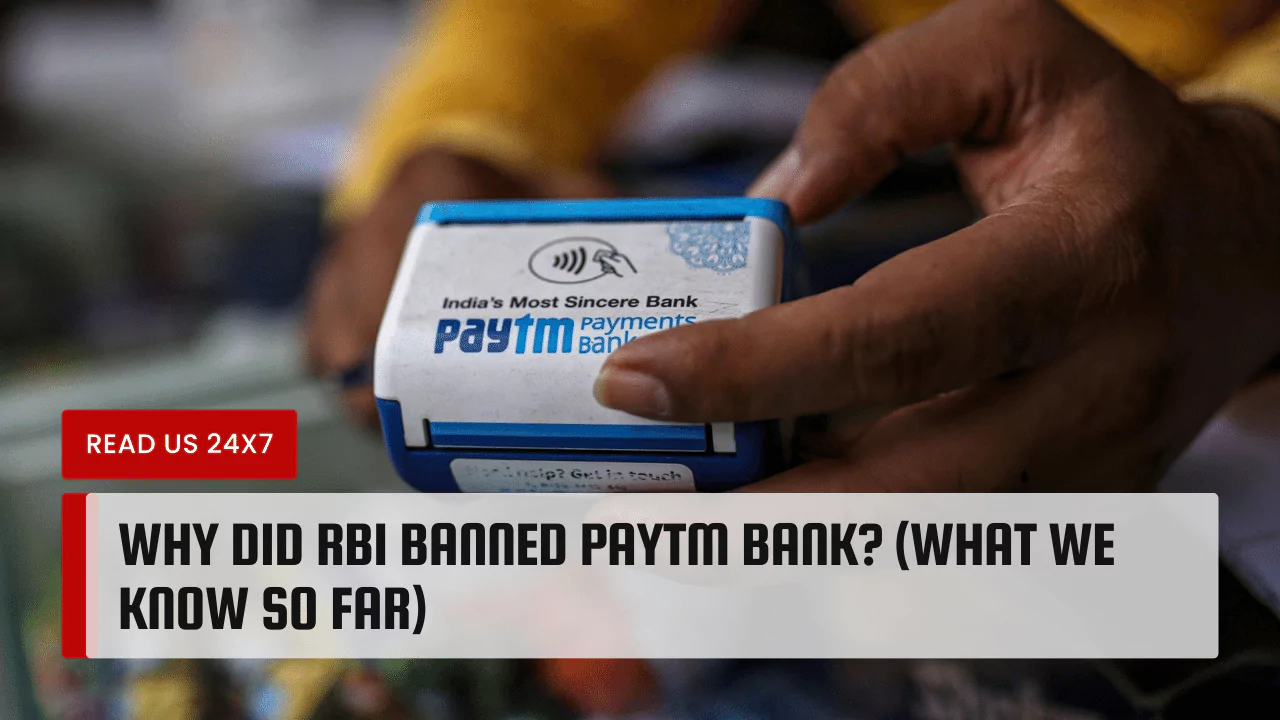The Reserve Bank of India (RBI) banned Paytm Payments Bank (PPBL) due to money laundering concerns and KYC non-compliance issues. The RBI also found that accounts were created without proper identification, potentially for money laundering.
The RBI’s crackdown on Paytm Payments Bank began in March 2022 when the RBI barred the bank from onboarding new customers and mandated thorough audits of its IT systems.
Starting from February 29, 2024, Paytm Payments Bank will be unable to:
- Collect deposits
- Conduct credit transactions
- Top up any customer accounts
- Top up prepaid cards
- Top up wallets
- Top up FASTags
- Top up NCMC (National Common Mobility Cards)
Background on Paytm Payments Bank
Paytm Payments Bank is a subsidiary of One 97 Communications Limited (OCL), the parent company of Paytm, India’s largest digital payments platform. Paytm Payments Bank was launched in 2017 as one of the first payment banks in India, a new category of banks that can accept deposits up to Rs 1 lakh, offer basic savings and current accounts, and provide payment and remittance services. However, they cannot lend money or issue credit cards.
Paytm Payments Bank claims to have over 64 million customers and 5 million merchants on its platform. It offers services such as savings accounts, current accounts, fixed deposits, debit cards, FASTags, National Common Mobility Cards, and insurance. It also acts as a business correspondent for other banks and facilitates transactions through UPI, BBPS, and AEPS.
Paytm Payments Bank is owned by OCL (51%) and Vijay Shekhar Sharma, the founder and CEO of Paytm (49%). However, RBI regulations require that payment banks be ring-fenced from their parent companies and operate independently. This means that Paytm Payments Bank cannot share its customer data, infrastructure, or brand name with OCL or Paytm.
Since its inception, Paytm Payments Bank has faced several issues raised by RBI regarding its compliance with the regulatory framework. Some of these issues include:
- KYC practices: Irregularities in KYC practices and multiple accounts linked to single PANs
- Accounts: Accounts at the bank were created without proper identification
- PAN cards: A single PAN card was linked to thousands of accounts
- KYC-anti money laundering rules: Violation of KYC-anti money laundering rules
- False compliance: Instances of false compliance
RBI’s Action Against Paytm
RBI has been closely monitoring the activities of Paytm Payments Bank and conducting periodic inspections to assess its compliance with the regulations. In March 2022, RBI directed Paytm Payments Bank to stop onboarding new customers with immediate effect, as a precautionary measure. However, the bank continued to operate its existing accounts and services.
In January 2024, RBI issued a press release stating that it had taken further action against Paytm Payments Bank under Section 35A of the Banking Regulation Act, 1949, which empowers the central bank to issue directions to banks in the interest of public safety and banking policy. The press release said that the Comprehensive System Audit report and subsequent compliance validation report of the external auditors revealed persistent non-compliance and continued material supervisory concerns in the bank, warranting further supervisory action.
Impact on Paytm and Customers
The RBI’s action against Paytm Payments Bank has serious implications for both the bank and its customers. The bank will have to stop offering its core services, such as deposits, payments, and remittances, and wind up its operations by March 15, 2024. The bank will also have to terminate its nodal accounts with One 97 Communications Limited and Paytm Payments Services Limited, which are the entities that facilitate transactions on the Paytm platform.
The customers of Paytm Payments Bank will not be able to add money to their accounts, wallets, FASTags, or cards after February 29, 2024. They will also not be able to use the bank’s services for fund transfers, bill payments, or UPI transactions. However, they will be able to withdraw or use their existing balances without any restrictions, up to their available balance.
The customers will also have to look for alternative options for their banking and payment needs, as Paytm Payments Bank will not be able to serve them after the deadline. Paytm has said that it will expand its existing relationships with leading third-party banks to distribute payments and financial services products. However, it is not clear how this will affect the customer experience, convenience, and security.
The RBI’s ban on Paytm Payments Bank is a major setback for the fintech company, which has been trying to establish itself as a leader in the digital payments space. The ban also raises questions about the viability and regulation of payment banks in India, which were introduced to promote financial inclusion and innovation. The RBI’s action may have a ripple effect on the other payment banks and the overall digital payments ecosystem in the country.


